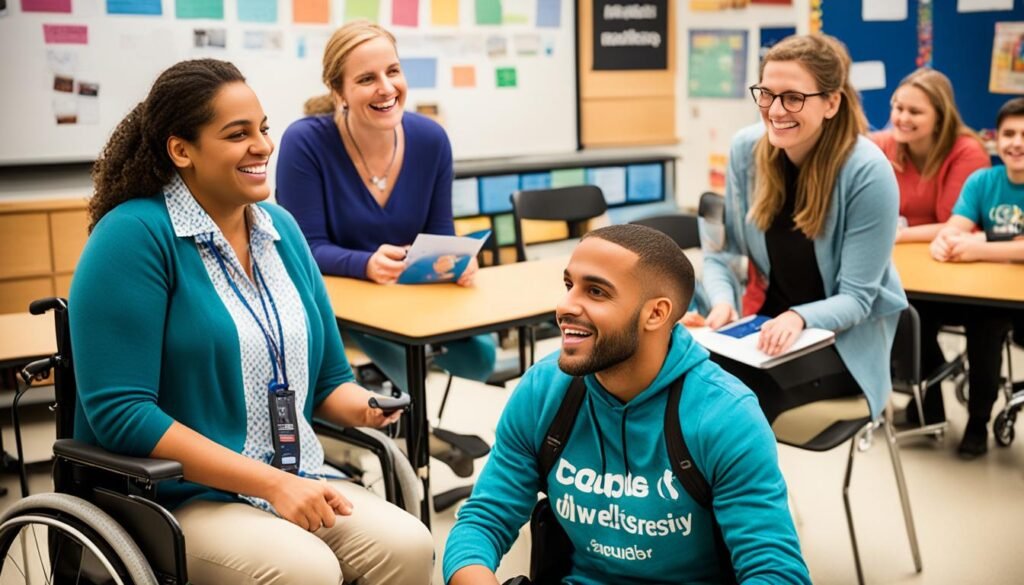Value Of A Master In Special Education brings many benefits. It helps educators improve as special education teachers. It opens up more career opportunities and income potential. A master’s degree prepares them for leadership roles and further studies. It’s very beneficial because there’s a big need for special education teachers. Also, general education teachers often lack the training to help students with disabilities well.
This degree gives a deep understanding of disabilities and individualized education plans (IEPs). Special education teachers with a master’s degree can really improve their students’ lives. Plus, it can boost your income. On average, those with a master’s degree earn over $12,000 more than those with a bachelor’s degree. A master’s degree opens doors to higher degrees too. You can aim for an Education Specialist (Ed.S.) or Doctoral (Ed.D. or Ph.D.) degree. These can lead to administrative, teaching at the university, or policymaking roles.
Also Read: Innovative Approaches In Nursing Education: Preparing The Next Generation Of Nurses
Key Takeaways
- A master’s degree in special education can improve your skills as a special education teacher, expand your career opportunities and income potential, and prepare you for leadership roles.
- Specialized knowledge and expertise gained through a master’s program can help you make a significant positive impact on the lives of your students.
- Earning a master’s degree can increase your earning potential, with educators holding a master’s earning over $12,000 more on average than those with a bachelor’s degree.
- Graduates of master’s programs in special education can pursue additional advanced degrees, such as an Ed.S. or doctoral degree, which can lead to administrative, university teaching, or policymaking roles.
- The nationwide shortage of special education teachers and the inadequate training of general education teachers in serving students with disabilities make a master’s degree in special education especially valuable.
Also Read: Unlocking Career Potential: The Doctor Of Education Degree
Specialized Training in Special Education
Master’s level programs in special education provide special training. They go beyond normal teacher courses. These courses help teachers understand various disabilities and needs students might have.
Also Read: Unlocking Potential: The Impact Of A Masters In Special Educations
Gaining Expertise in Disabilities and Learning Needs
Students learn to make and carry out Individualized Education Plans (IEPs). These plans help meet each student’s needs. They also study how to work with other teachers and use technology to help all students learn.
Also Read: Innovative Teaching Methods Through A PHD In Education
Understanding Individualized Education Plans (IEPs)
This training prepares special ed teachers to create and improve student plans. These plans help students with disabilities do well in school with their peers.
Also Read: The Path To Teaching: Benefits Of An Education Degree
Mastering Inclusive Classroom Strategies
Teachers learn a lot about disabilities, IEPs, and ways to include all students in class. Master’s trained special ed teachers change their students’ lives. They help kids with various needs succeed in school.
Improving Student Outcomes

Earning a master’s degree in special education is more than a title. It’s a way to directly help students with disabilities succeed. These graduates can tackle the big achievement gaps often seen in schools. By making learning more inclusive and adapting teaching methods, special education teachers can truly make a difference.
Studies show that with the right support, as many as 85% of students with disabilities can do well in regular classes. Having Master’s-prepared special education teachers leads to better chances for these students. They get the tailored and high-quality education they need to flourish.
Addressing Achievement Gaps
A master’s in special education helps educators bridge the gap between students with disabilities and others. These gaps come from various problems like not enough support or not using the best teaching methods. With the right training, educators can make a big difference.
Maximizing Learning Opportunities for Students
A master’s program gives special education teachers special skills. They learn how to adjust their teaching to help all kinds of learners. They use cool tools like tech devices, work closely with other teachers, and create fun, helpful classrooms. This way, they make sure every student has a chance to learn well.
Implementing Evidence-Based Practices
Teachers who earn a master’s in special education know the best methods for helping students with disabilities. They learn about smart ways to plan lessons, handle behavior, and support all students. These “best practices” are based on research and are well-known to boost student success.
Career Advancement Opportunities

Getting a master’s degree in special education offers many chances to move up in your career. Graduates might aim for important jobs like special education director or coordinator. They lead special education efforts and give advice to school staff and students. In 2019, the average pay for special education directors was $72,878 yearly. This is more than what special education teachers earned on average in 2018.
Becoming a Special Education Director or Coordinator
A master’s degree teaches invaluable skills for those wanting to be in charge. Special education directors or coordinators lead the way in implementing policies and services. They guide special education efforts within a school district or educational group.
Pursuing Administrative Roles
A master’s degree can also help you get into school administration. This means you could help shape special education programs and policies broadly. To take on these key roles, you need deep knowledge and advanced skills from your master’s in special education.
Value Of A Master In Special Education

Special education teachers are needed all over, with many states in a critical shortage. Currently, 6.7 million students aged 3-21 receive special education services. Getting a master’s in special education allows you to fulfill this need. It also gives you the opportunity to greatly impact students with disabilities.
Meeting the Nationwide Demand for Special Educators
There’s a growing nationwide demand for special education teachers. Schools are finding it hard to fill these critical roles. A master’s degree in special education will help you prepare for this need. It lets you make a real difference in students’ lives who require extra support.
Earning Potential and Salary Increases
Aside from increasing your skills, a master’s degree can also boost how much you earn. Educators with a master’s earn over $12,000 more a year than those with a bachelor’s. This salary increase shows the importance school districts place on your advanced knowledge in special education.
Professional Board Certification Eligibility
A master’s degree also qualifies you for the American Academy of Special Education Professionals’ Professional Board Certification. This recognizes the highest level of professionalism in special education. Getting this credential boosts your career opportunities and how you’re seen in the special education community.
Inclusive Education and Classroom Collaboration
Inclusive education joins students with disabilities in regular classrooms. This approach boosts their chances to learn both socially and academically. But, making inclusive education work well relies a lot on how special and general educators work together.
Co-Teaching with General Education Teachers
Special education teachers with master’s degrees know how to co-teach. They use these skills to team up with general education teachers. Together, they offer teaching that’s tailored to each student’s needs. This ensures every student gets the attention they need to do well.
Assistive Technology in Special Education
Special educators with advanced degrees also know a lot about assistive technology. This kind of tech can make a big difference in learning for students with various needs. It includes things like software that reads text aloud, devices for communicating, and tools designed to meet special needs. These technologies help more students get involved in the lessons and make the classroom more inclusive.
By using classroom collaboration and technology together, these educators make the most of inclusive education. They ensure that each student receives teaching that fits them, no matter their learning style.
Special Education Advocacy

Special education teachers with master’s degrees play a key role in fighting for students with disabilities. They help make sure these students get the top-notch, inclusive education they should. They know what kinds of support and learning environment these students really need. And they’re good at getting them the right help.
Advocating for Students with Disabilities
Specialized teachers with master’s degrees are champions for students with disabilities. They team up with parents, school leaders, and people who make the rules. Their goal is to get these students everything they need to do well in school and in life. By speaking up for these students, they really change lives.
Promoting Inclusive Education Policies
These advanced-degree educators do more than help one student at a time. They also push for rules that make schools more inclusive. Their work aims to have students with disabilities fully joining in with others in regular classes.
Advancing Your Education Further

Earning a master’s in special education can help you go further in your career. You might want to aim for an Education Specialist (Ed.S.) degree. This degree is for those who want to lead in education, design new teaching methods, or help set school rules. Or, you might choose to get a Doctoral degree in Education (Ed.D. or Ph.D.). This would lead to teaching at a university, doing important research, or making large decisions that affect many schools.
Pursuing Education Specialist (Ed.S.) Degrees
Getting an Education Specialist (Ed.S.) degree lets you build on your master’s learning in special education. This degree helps you become a leader in special education, like a director or coordinator. With an Ed.S., you can help make new lessons, school rules, and work on making education open to everyone.
Doctoral Degrees in Education (Ed.D. or Ph.D.)
For the highest education level, there’s the Doctoral degree in Education (Ed.D. or Ph.D.). These degrees are for making a big difference in special education. You could become a university professor, lead research, or help make education policies. By studying deeply and adding to what we know in special education, you can help bring new ideas and a better future for education.
These degrees unlock new ways to affect special education and help you make a bigger difference in the field.
Behavior Management and Social Skills
Special education teachers must know how to manage behavior and promote social-emotional learning for students. They learn these skills in master’s programs. Teachers get trained in positive behavior intervention strategies, making classrooms that are great for learning and making friends.
Positive Behavior Intervention Strategies
Master’s program graduates know how to use proven methods to encourage good behavior. They teach in a way that’s about preventing problems and praising good actions, not just reacting when something goes wrong. Using these positive behavior intervention strategies, teachers make students feel they can take charge of their actions. They also help students learn essential social skills in a welcoming classroom.
Social-Emotional Learning Techniques
Special education teachers also learn about social-emotional learning techniques in their programs. These techniques improve students’ understanding of themselves and how to get along with others. Through these methods, teachers help students grow in a way that supports their schoolwork and behavior. They look at every part of a student’s growth, not just their academic side.
By using what they’ve learned, special education teachers can help their students in many ways. They support their education and also their behavior, making school a good place for everyone.
Assistive and Instructional Technology

Special education teachers with master’s degrees know how to use both assistive and instructional technology well. They can make learning personalized and effective for each student. Teachers learn to use tech for teaching that fits each student’s needs.
Using Technology for Individualized Learning
They use assistive technologies like text-to-speech and special devices. These help students with disabilities learn better. They also use instructional technologies to make classrooms work for all students. It makes learning more fun and social for everyone.
Assistive Technology for Students with Disabilities
Masters-educated special educators use many tech tools. These tools make learning right for each student. This kind of teaching makes sure every learner feels part of the class. It also lets teachers help students who learn in different ways.
Collaboration with Specialists and Families

Special education depends on teamwork with various specialists and families. Teachers with advanced degrees play a key role in these teams. They work with speech therapists, occupational therapists, and others. Together, they create plans that cover all the needs of every student.
Working with Speech-Language Pathologists
Speech therapists are a crucial part of the team, helping students with talking and understanding. Special ed teachers and these therapists work together closely. They make plans that are just right for each student’s unique needs. This teamwork makes sure students get all the help they need to do their best.
Engaging with Parents and Caregivers
Special ed teachers also know how to build strong bonds with parents and caregivers. They see parents as key partners in helping their child learn. By working together, teachers and families use their different but important knowledge. This helps create a learning space where all students can thrive.
Also Read: What Are The Core Courses In A Bachelor Degree In Education Program?
Conclusion
Earning a master’s degree in special education is a smart career move. It not only boosts your skills but also helps students. With this degree, you’ll be ready to lead in special education. You can enhance student success, bridge achievement gaps, and push for inclusive education rules.
This degree is perfect if you dream of directing special education or going into other top roles. It can also help you advance in your studies with advanced degrees. Choosing a master’s in special education means you’re committed to bettering education for all. It can open many doors for your career.
Getting a master’s degree in special education means you’re investing in more than just yourself. It’s a key to advocate for students with disabilities. With this degree, you can make sure learning is open to all. You will lead in improving special education today and tomorrow.
FAQs
Q: What is a master in special education and why is it valuable?
A: A master in special education is a graduate degree program designed to provide advanced training in teaching students with diverse learning needs. It is valuable for educators who want to specialize in inclusive education and work with students who require additional support.
Q: How can I pursue a master in special education?
A: To pursue a master in special education, you typically need to have earned a bachelor’s degree in education or a related field. You can apply to graduate programs offered by universities that focus on special education.
Q: What does the coursework in a master in special education program entail?
A: The coursework in a master in special education program usually covers topics such as educational psychology, teaching methods for students with diverse learning needs, behavioral assessment and intervention, and curriculum development for inclusive classrooms.
Q: What are the benefits of completing a master’s degree program in special education?
A: Completing a master’s degree program in special education can enhance your teaching skills, provide you with a deeper understanding of how to work with students with disabilities, and help you differentiate instruction to meet individual learning needs.
Q: Will earning a master in special education help me obtain a teaching license?
A: Earning a master in special education can help you meet the requirements for obtaining a teaching license in some states. It is important to check with your state’s requirements for teacher preparation and certification.
Q: Can I work with students in special education with a master in special education degree?
A: Yes, with a master in special education degree, you will have the qualification and expertise to work with students in special education settings, including K-12 schools, inclusive classrooms, and other educational environments.
Q: What career opportunities are available for individuals with a master in special education?
A: Individuals with a master in special education degree can pursue careers as special education teachers, inclusion specialists, educational consultants, behavior interventionists, curriculum developers, or school administrators.





